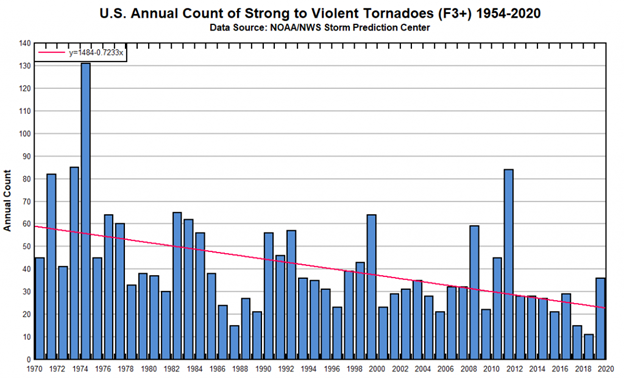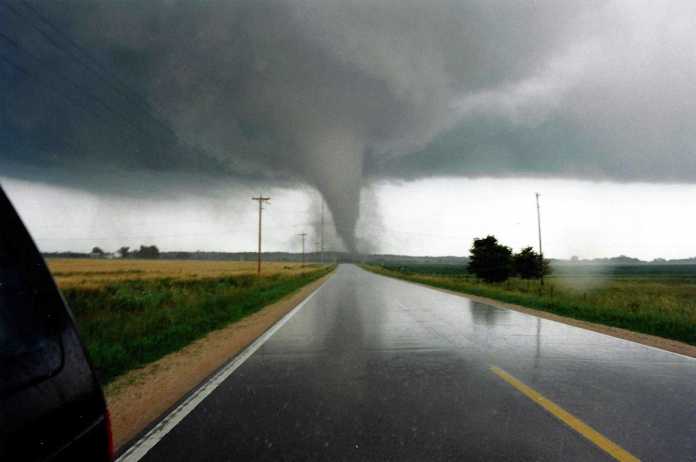This article originally appeared in American Thinker on April 7, 2023.
After the recent devastating tornadoes in the Midwest and South, some media outlets scrambled to try to link the weather events to climate change, when in fact there is no hard data to support this. In fact, tornado data refute claims that tornadoes are increasing in number, range, or severity. However, Salon, Axios, and the Washington Post among others ran articles suggesting climate change is expanding the length of tornado season and area over which tornadoes commonly form, as well as adding ingredients to the atmosphere to make more and bigger tornadoes.
The Salon article, “How climate change made the Mississippi tornadoes more likely,” (actually a reprint from Grist) claimed, “That added ingredient of more heat and moisture is going to be the big thing that will influence what happens and we can expect potentially worse tornado outbreaks,” said William Gallus, a professor of meteorology at Iowa State University.
Axios piled on with “What we know about how climate change affects tornado outbreaks,” which claims, “We also have expectations that the number of severe thunderstorms (hail, wind, tornado) will probably increase in the U.S.”
The Washington Post article, “Here’s what we know about how climate change is influencing tornadoes,” asserts, “Average global temperatures have risen more than 1.1 degrees Celsius (2 degrees Fahrenheit) since the late 1800s, and the impact is clear: Warmer air provides more energy for storms to develop and intensify, and holds more moisture, which can also fuel storms. Warm, moist air is a key ingredient for developing severe tornadic storms.”
These claims of increased storms due to more heat and moisture are misleading at best and demonstrate a clear lack of understanding of how weather fronts collide to form tornadoes. As Climate at a Glance: Tornadoes points out: “Tornadoes typically form when very cold, dry air clashes with warm, humid air. Climate change warms the Arctic more than the tropics and subtropics, resulting in less of a clash between cold Arctic air masses and warm Gulf of Mexico air masses. As a result, fewer and less violent tornadoes are occurring today than in previous periods, despite media claims that tornadoes are getting more frequent, stronger, or both.”
Plus, all of these articles miss one very important and immutable fact: decades of hard data on tornado activity don’t support these claims. See Figure 1.

Despite modest warming of the climate over the past 50 years, data show no trend in increasing tornadoes linked to climate change. Indeed, the Intergovernmental Panel on Climate Change (IPCC) said in its most recent report, “There is low confidence in observed trends in small spatial-scale phenomena such as tornadoes.”
These articles all focused on the recent severe storms that caused many deaths and widespread destruction. Yet, looking at the actual data for the trend in strong to violent tornadoes suggest no cause for alarm. Violent tornadoes, those rated EF3 to EF5 on the enhanced Fujita tornado scale, have declined in recent decades, based on actual data supplied by the National Weather Service’s Storm Prediction Center.
The hard data on tornado numbers and intensity refute any assertions that tornadoes are worsening due to climate change. The number of strong to violent tornadoes, F3 or higher, has dramatically declined for nearly half a century. Additional evidence shows attempts to tie tornadoes to climate change falls flat. For instance, 2018 was a record-low year for tornadoes in the United States. Even the Washington Post wrote that 2018 was the first year with no violent tornadoes in the United States.
Also flying in the face of climate change attribution during the so-called “hottest decade in recorded history” from 2010 to 2019, two record-low years for tornado strikes in the United States occurred, in 2014 and 2018.
Finally, it is important to note that severe tornado outbreaks are not a global (as in global warming) phenomenon, but mostly limited to the United States with its unique topography and weather patterns.
All of these omissions lead one to ask if the media are aware of hard data and previous articles on the topics of tornados and climate change, or did these outlets simply not wish to consider what those articles and data implied, because they presented inconvenient truths that are counter to their attempts to link climate change and tornado behavior?
Even the scientist quoted in the Post article would not commit to the narrative that climate change was changing tornado behavior.
Per the Post, “That suggests more tornadoes may be likely, too. But scientists aren’t ready to declare that yet.”
Also, according to the Post, “There is nothing concrete to say, ‘Yes, we’re going to see more tornadoes,’ Allen said,” as Dance reported.
The willful choice to ignore these facts is indicative of the shoddy state of what passes for journalism today. The Washington Post’s banner reads, “democracy dies in darkness.” Evidently, science dies in darkness, too.

















